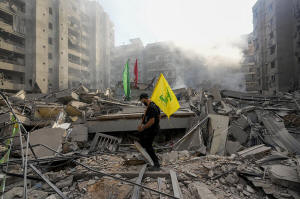A diminished Hezbollah is made even weaker by the toppling of Assad in
Syria
 Send a link to a friend
Send a link to a friend
 [December 14, 2024]
By BASSEM MROUE and KAREEM CHEHAYEB [December 14, 2024]
By BASSEM MROUE and KAREEM CHEHAYEB
BEIRUT (AP) — A severely hobbled Hezbollah was in no position to help
defend former Syrian President Bashar Assad, a longtime ally, from the
lightning-fast insurgency that toppled him. With Assad gone, the
militant group based in Lebanon is even weaker.
Hezbollah was dealt a major blow during 14 months of war with Israel.
The toppling of Assad, who had strong ties to Iran, has now crippled its
ability to bounce back by cutting off a vital weapons-smuggling route
through Syria.
Hezbollah officials are deeply concerned but defiant.
“What is happening in Syria is a major, dangerous and new change, and to
know why this happened needs evaluation,” Hassan Fadlallah, a Lebanese
lawmaker who represents Hezbollah's political wing, said during a speech
at a funeral for militants killed by Israel. “Whatever is happening in
Syria, despite its dangers, will not weaken us.”
Analysts say the diminishment of Hezbollah will have big consequences
for Lebanon, where for decades it has been a major political player —
and for Iran, which has relied on the group as one of several proxy
forces projecting power across the Middle East. It is also a
game-changer for Israel, whose nemesis on its northern border is now at
its most vulnerable point in decades.

Ties to Syria influenced the rise and fall of Hezbollah's power
The Assad dynasty, which ruled Syria for half a century with an iron
fist, played a crucial role in empowering Hezbollah, which was founded
in the early 1980s by Iranian advisers who came through Syria. In
addition to being a conduit for Iranian weapons, Syria also was a place
where Hezbollah trained fighters and manufactured its own weapons.
As Hezbollah grew more powerful, it became a force Assad could rely on
for protection in times of crisis. Hezbollah sent thousands of fighters
to bolster Assad's forces when a civil war broke out in 2011.
As insurgents swept across Syria in early December and took the city of
Homs — a stone’s throw from a Syrian border town where Hezbollah had a
presence — many expected the militants to put up a fierce fight. After
all, they did just that in 2013, preventing Assad's opponents from
advancing into Damascus.
This time, Hezbollah was in disarray. Many of its top officials,
including longtime leader Hassan Nasrallah, were killed in Israeli
airstrikes. And months of Israeli bombardment destroyed much of its
military infrastructure. With Syria's key international allies, Russia
and Iran, on the sidelines, Hezbollah withdrew, and Assad was ousted
quickly.
“The fall of the regime marks the end of Iran’s arms in Syria and
Lebanon,” said Lt. Col. Fares al-Bayoush, a Syrian army defector who
fought in the civil war against Assad's forces and Hezbollah until 2017,
when he moved to Turkey.
Lebanon begins to grapple with Hezbollah's ‘new reality’
In Lebanon, the sapping of Hezbollah's strength has given the army the
opportunity to reassert control it had ceded, especially along its
southern border. A U.S.-brokered ceasefire between the militant group
and Israel states that Hezbollah should have no armed presence along
that border and it has led to growing calls within Lebanon for the
group's disarmament.
[to top of second column]
|

A man carries a Hezbollah flag as he walks on the rubble of his
destroyed apartment following an Israeli airstrike in Lebanon, Nov.
1, 2024. (AP Photo/Hassan Ammar, File)

“To Hezbollah, it’s game over,” Samir Geagea, who leads the
Christian Lebanese Forces Party, said in a statement on Sunday,
hours after insurgents took Damascus. “Sit with the Lebanese
military to end your status as an armed group, and transform
yourselves into a political party.”
But Hezbollah’s longtime sway in the political arena in Lebanon also
faces a major challenge.
Many in Lebanon are angry with the group. Critics say Hezbollah
violated its promise to use its weapons only to defend Lebanon when
it began firing rockets into Israel last year, the day after Hamas —
another Iranian-backed group — attacked Israel.
Nearly than 4,000 people were killed in Lebanon during the war with
Israel, according to the country's health ministry. Entire towns and
villages where Hezbollah militants and their supporters lived have
been flattened. More than 1 million people have been displaced, and
the country's economy — which was in bad shape before the war — is
in a deep hole.
“With the (Syrian) regime gone, Hezbollah in Lebanon faces an
entirely new reality,” said Firas Maksad, of the Middle East
Institute.
Maksad said many Lebanese leaders have yet to grasp the magnitude of
the change that has taken place. Even some onetime allies of
Hezbollah in parliament have begun distancing themselves from the
group.
Gebran Bassil, a lawmaker who represents the Free Patriotic
Movement, Lebanon’s other major Christian party, said Hezbollah's
loss of a weapons pipeline from Iran could help Lebanon extract
itself from regional conflict.
“Hezbollah should focus on internal affairs and not the wider
region,” Bassil, a former ally of Hezbollah, said.

It may have no choice but to narrow its ambitions. With the fall of
Assad, Iran has lost control of a corridor of land that stretched
through Iraq and Syria all the way to the Mediterranean, and which
gave it an unimpeded route to supply Hezbollah.
“They can maybe fly in some things and smuggle some things, but
that’s not gonna be on the same scale, not even close," said Aron
Lund, a Syria expert with Century International, a New York-based
think tank.
For Israel, breaking Iran’s regional network has been a major goal,
though it is wary over Islamic militants among the insurgents who
toppled Assad. Israel on Sunday moved troops into a demilitarized
buffer zone with Syria by the Israel-held Golan Heights in what it
called a temporary security measure.
Prime Minister Benjamin Netanyahu called Assad’s fall a “historic
day,” saying it was “the direct result of our forceful action
against Hezbollah and Iran, Assad’s main supporters.”
All contents © copyright 2024 Associated Press. All rights reserved |